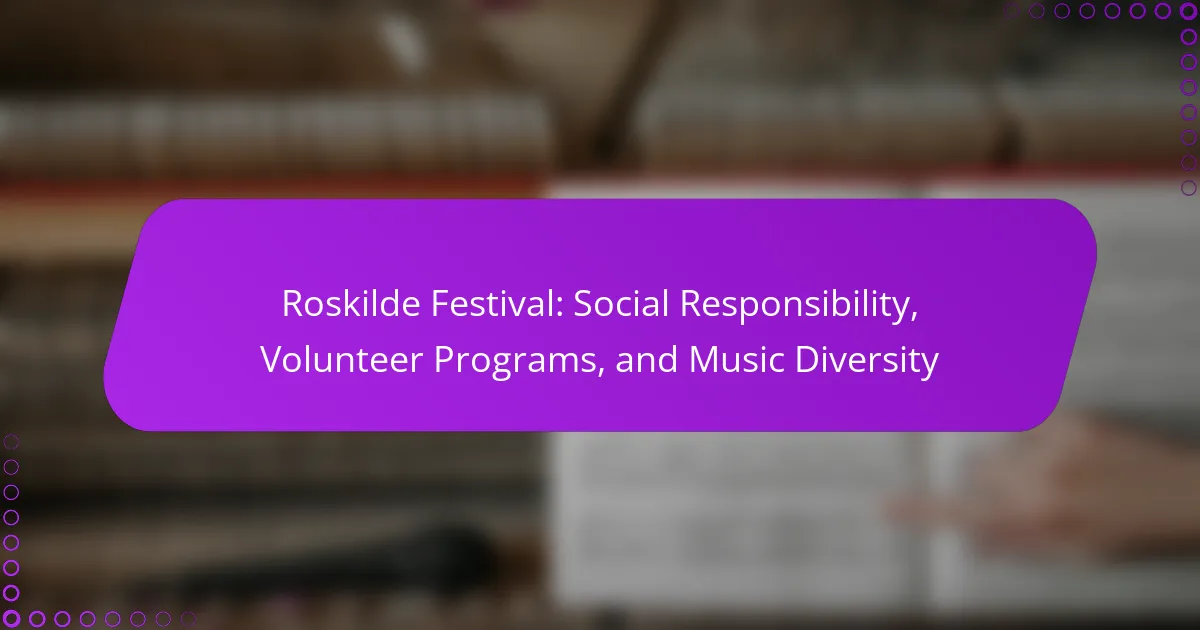Roskilde Festival stands out for its commitment to social responsibility, offering diverse volunteer programs and a rich array of musical genres. The festival promotes sustainability through waste reduction and renewable energy initiatives. It actively engages local communities and supports underrepresented artists, enhancing cultural exchange. By measuring its social impact, Roskilde Festival reinforces its dedication to fostering inclusivity and community ties.
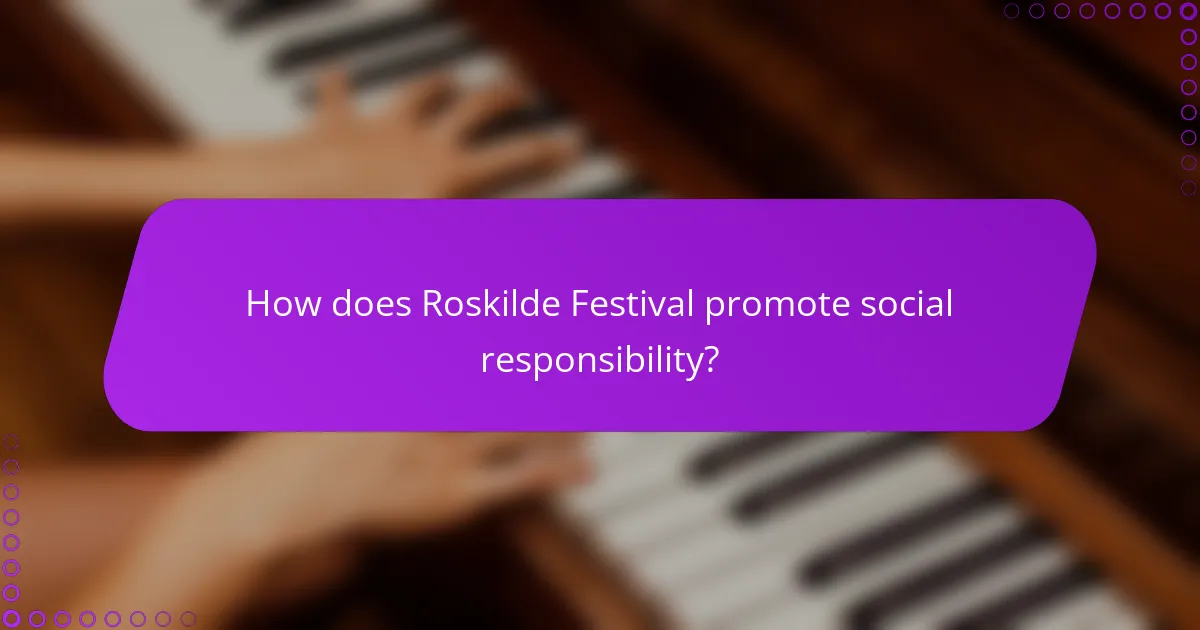
How does Roskilde Festival promote social responsibility?
Roskilde Festival promotes social responsibility through community engagement, sustainability initiatives, and diverse volunteer programs. The festival emphasizes environmental awareness by implementing waste reduction strategies and promoting renewable energy sources. It actively involves local communities by supporting cultural activities and charities, enhancing social cohesion. Additionally, the festival’s volunteer programs encourage participation, offering individuals a chance to contribute positively while gaining valuable experience.
What initiatives support environmental sustainability at the festival?
Roskilde Festival supports environmental sustainability through initiatives like waste reduction, renewable energy use, and eco-friendly transportation options. The festival implements a comprehensive recycling program, aiming for a significant reduction in waste sent to landfills. Additionally, it promotes the use of public transport and bicycles to minimize carbon emissions. The festival’s commitment includes partnerships with organizations focused on environmental conservation, enhancing its impact on sustainability.
How does the festival engage with local communities?
Roskilde Festival engages with local communities through initiatives that promote social responsibility and volunteer programs. The festival collaborates with local organizations, providing opportunities for community members to participate in various activities. This involvement fosters a sense of belonging and encourages cultural exchange. Additionally, the festival prioritizes music diversity, showcasing local artists alongside international acts, enhancing community representation.
What partnerships enhance social impact during the event?
Partnerships that enhance social impact during the Roskilde Festival include collaborations with NGOs, local communities, and sustainable brands. These partnerships focus on social responsibility, promote volunteer programs, and support music diversity. For example, NGOs provide resources for community engagement, while local businesses contribute to the festival’s sustainability efforts. Additionally, the festival collaborates with diverse music acts to promote inclusivity and cultural exchange.
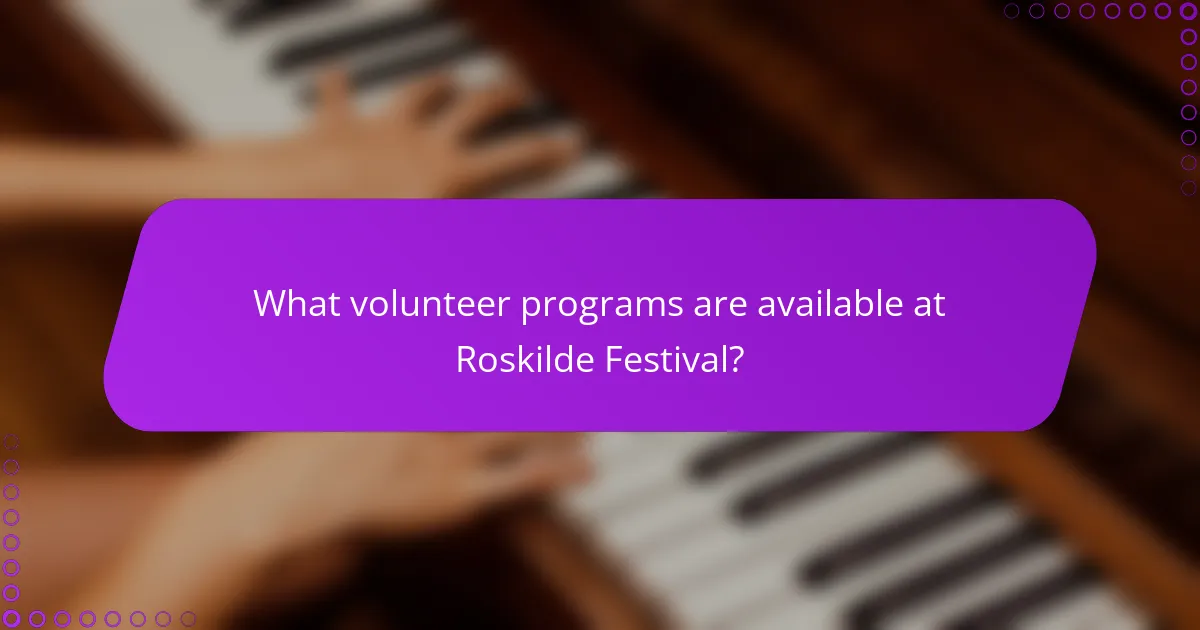
What volunteer programs are available at Roskilde Festival?
Roskilde Festival offers various volunteer programs, including roles in festival operations, sustainability initiatives, and community engagement. Volunteers gain unique experiences, such as working behind the scenes and contributing to social responsibility efforts. Opportunities vary in duration and responsibilities, catering to diverse interests and skills.
How can individuals get involved in volunteering?
Individuals can get involved in volunteering at the Roskilde Festival by signing up for various programs that promote social responsibility and music diversity. These programs offer opportunities to contribute to the festival’s community initiatives while enjoying a unique cultural experience. Volunteers can engage in tasks ranging from event organization to assisting with sustainability efforts. The festival values the contributions of volunteers, often providing them with training and support. Additionally, volunteering fosters connections with like-minded individuals passionate about music and social causes.
What are the benefits of volunteering at the festival?
Volunteering at the Roskilde Festival offers numerous benefits, including personal growth, community engagement, and unique experiences. Participants gain skills in teamwork and event management while connecting with diverse individuals. Additionally, volunteers contribute to the festival’s social responsibility initiatives, enhancing their sense of purpose. This engagement fosters a deeper appreciation for music diversity and cultural exchange.
How does the festival train and support its volunteers?
The festival trains and supports its volunteers through comprehensive programs and resources. Volunteers receive training sessions that cover safety, teamwork, and festival operations. Ongoing support includes mentorship and access to resources that enhance their experience. The festival emphasizes community building, fostering a sense of belonging among volunteers. Additionally, volunteers benefit from networking opportunities, which can lead to future career paths in the music industry.
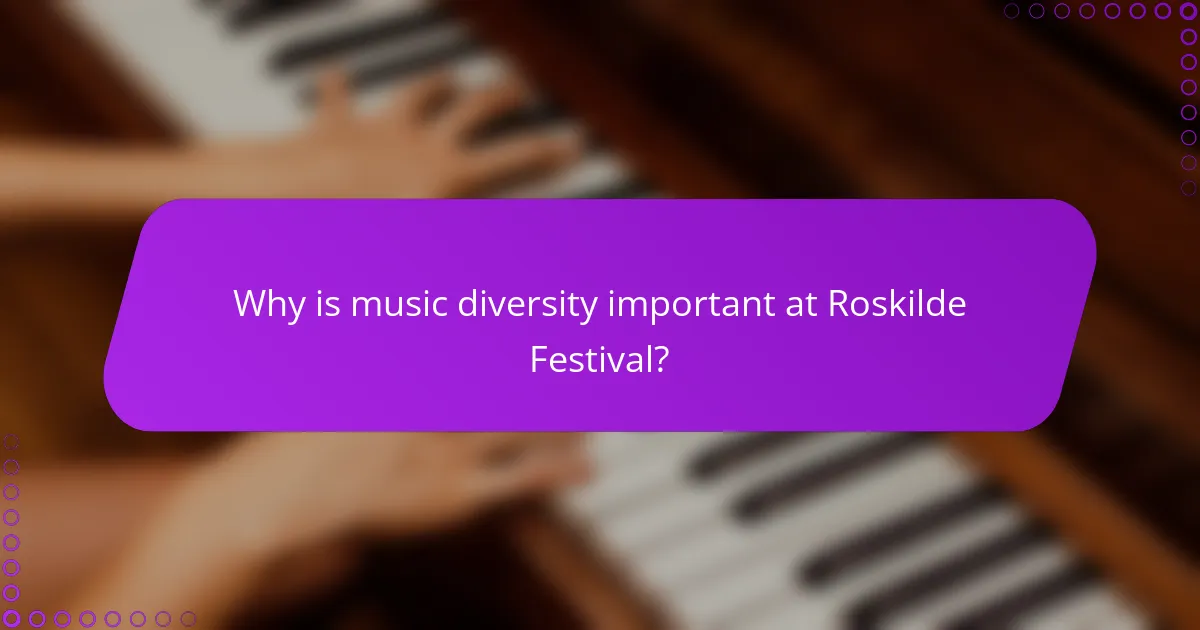
Why is music diversity important at Roskilde Festival?
Music diversity at Roskilde Festival is vital for fostering inclusivity and cultural expression. A varied lineup promotes social responsibility by representing different genres and backgrounds, allowing attendees to experience a wide range of musical traditions. This diversity enriches the festival atmosphere, encouraging collaboration and understanding among diverse communities. Moreover, it aligns with the festival’s commitment to volunteer programs that support underrepresented artists, enhancing the overall cultural landscape.
How does the festival curate its music lineup?
The Roskilde Festival curates its music lineup through a collaborative approach involving artists, volunteers, and diverse genres. The festival prioritizes inclusivity and social responsibility, ensuring a wide range of musical styles. It actively seeks emerging talents alongside established acts, fostering a dynamic and varied lineup. This commitment to diversity enhances the festival’s unique cultural experience, making it a reflection of global music trends.
What genres are represented at the festival?
Roskilde Festival features a diverse range of genres including rock, pop, hip-hop, electronic, and world music. This variety reflects the festival’s commitment to inclusivity and social responsibility. The lineup often showcases both established artists and emerging talents, enhancing the festival’s reputation for musical diversity.
How does the festival promote emerging artists?
The Roskilde Festival promotes emerging artists through dedicated stages, mentorship programs, and opportunities for exposure. The festival features a talent development initiative that supports new musicians by providing them with performance slots. These opportunities allow artists to reach diverse audiences and gain industry recognition. Additionally, the festival collaborates with local music schools, enhancing its commitment to nurturing fresh talent. This approach not only enriches the festival experience but also contributes to the broader music ecosystem.
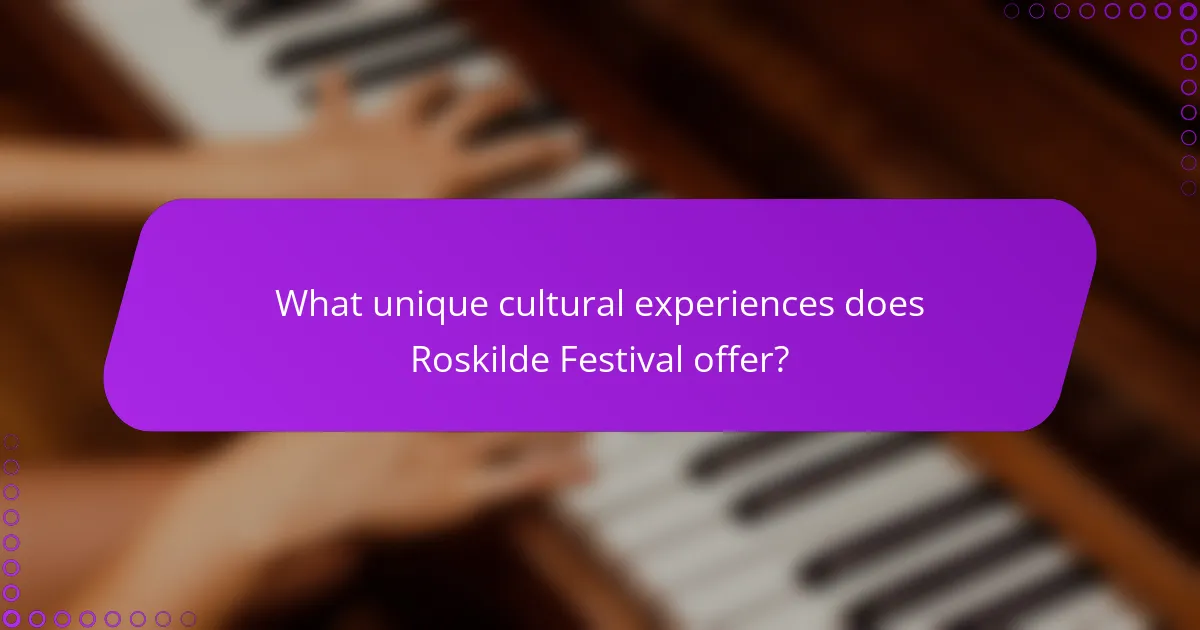
What unique cultural experiences does Roskilde Festival offer?
Roskilde Festival offers unique cultural experiences through its commitment to social responsibility, diverse music genres, and extensive volunteer programs. The festival fosters community engagement by encouraging volunteer participation, which enhances the social fabric of the event. Additionally, it showcases a wide range of musical styles, promoting cultural exchange and inclusion. This blend of music diversity and volunteerism creates a vibrant atmosphere that celebrates creativity and collaboration.
How do art installations contribute to the festival atmosphere?
Art installations enhance the festival atmosphere by creating immersive experiences that engage attendees. They serve as focal points for social interaction and artistic expression. These installations often reflect themes of social responsibility, aligning with the festival’s values. Unique installations can spark conversations about important issues, fostering a sense of community among diverse festival-goers. Additionally, they contribute to the overall aesthetic, transforming the festival grounds into a vibrant cultural landscape.
What role does food diversity play in the festival experience?
Food diversity enhances the festival experience by offering varied culinary options that reflect cultural richness. It fosters community engagement and promotes social responsibility through local sourcing and sustainable practices. Diverse food choices cater to different dietary needs, ensuring inclusivity. Festivals like Roskilde prioritize food diversity to enrich the overall atmosphere, creating memorable connections among attendees.
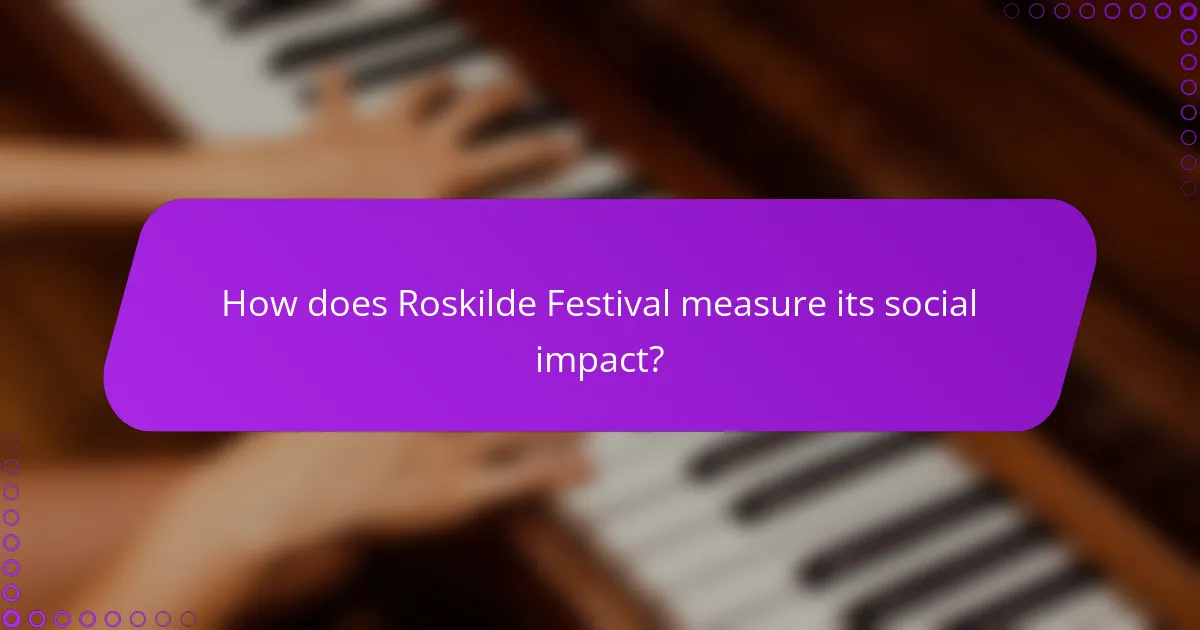
How does Roskilde Festival measure its social impact?
Roskilde Festival measures its social impact through various initiatives focused on community engagement and sustainability. The festival emphasizes social responsibility by supporting volunteer programs that foster local involvement. It tracks metrics such as volunteer hours, community partnerships, and environmental initiatives to evaluate its effectiveness. By promoting music diversity, the festival enhances cultural exchange and social cohesion, further contributing to its positive social footprint.
What metrics are used to evaluate success in social responsibility?
Roskilde Festival evaluates success in social responsibility through metrics like community engagement, volunteer participation rates, and environmental impact assessments. These metrics reflect the festival’s commitment to social causes and its influence on music diversity.
| Metric | Description | Value |
|——————————|———————————————–|————————–|
| Community Engagement | Number of local partnerships | 50+ |
| Volunteer Participation Rate | Percentage of attendees volunteering | 30% |
| Environmental Impact Score | Assessment of sustainability initiatives | 85/100 |
| Diversity of Artists | Representation of different music genres | 20+ genres |
| Social Program Funding | Amount allocated to social responsibility | €1 million |
How does audience feedback shape future initiatives?
Audience feedback significantly influences future initiatives at Roskilde Festival by guiding program development and enhancing community engagement. Insights from attendees shape volunteer programs, ensuring they align with participant expectations and values. For example, feedback on music diversity leads to a broader selection of artists, reflecting audience preferences. This iterative process ensures that the festival remains relevant and socially responsible, fostering a strong connection with its audience.
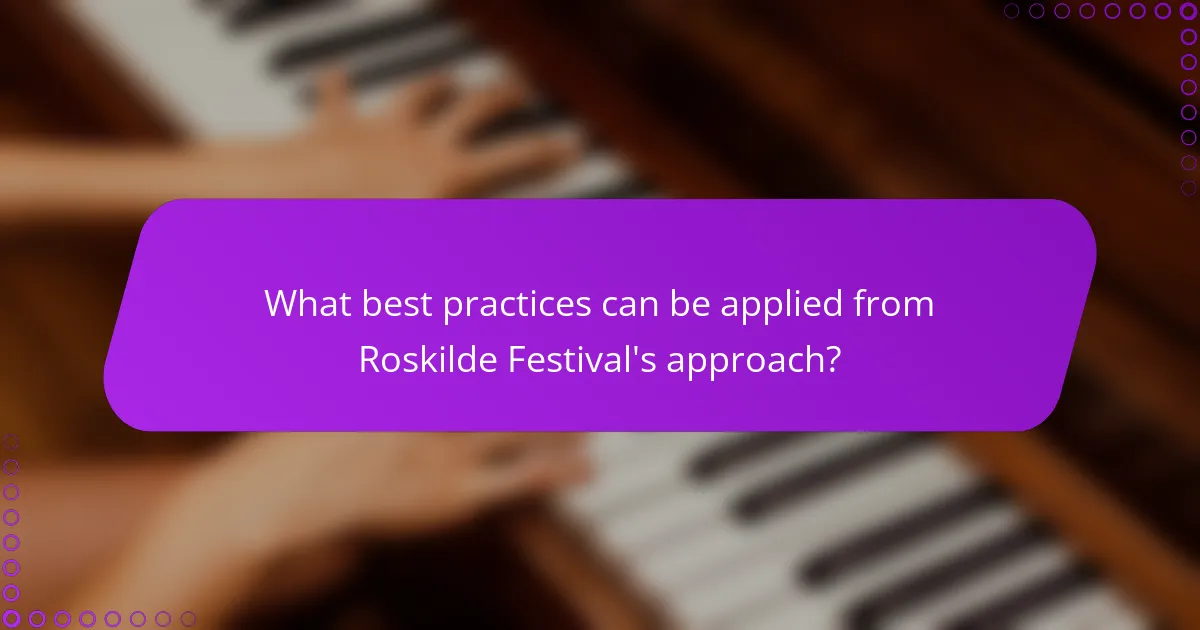
What best practices can be applied from Roskilde Festival’s approach?
Roskilde Festival’s approach emphasizes sustainable practices, community engagement, and diverse music programming. Best practices include fostering social responsibility through environmental initiatives, implementing robust volunteer programs, and promoting inclusivity in music selection. These strategies enhance participant experience and strengthen community ties.
What lessons can other festivals learn about social responsibility?
Roskilde Festival offers valuable lessons in social responsibility through its community engagement and diverse volunteer programs. Other festivals can adopt similar models to enhance their social impact. For instance, Roskilde emphasizes sustainability by integrating eco-friendly practices, which can inspire others to prioritize environmental awareness. Additionally, their focus on inclusivity in music programming fosters a sense of belonging, encouraging festivals to showcase diverse talent. By establishing clear volunteer roles, Roskilde empowers individuals, promoting active participation and social cohesion. These strategies collectively demonstrate how festivals can effectively contribute to their communities while enhancing the overall festival experience.
How can organizations implement similar volunteer programs effectively?
Organizations can implement effective volunteer programs by fostering community engagement, providing clear roles, and ensuring adequate training. Establishing partnerships with local entities enhances outreach and support. Regular feedback loops improve program quality and volunteer satisfaction. Recognizing contributions boosts morale and retention.
What strategies enhance music diversity in large events?
Implementing strategies that promote music diversity at large events like the Roskilde Festival involves several key approaches. These include curating a diverse lineup that features various genres, encouraging emerging artists, and prioritizing underrepresented voices.
The festival actively collaborates with local and international organizations to ensure a broad representation of cultures and styles. Additionally, it employs volunteer programs that engage diverse communities, fostering inclusivity and participation.
By prioritizing social responsibility, the Roskilde Festival creates an environment where music diversity thrives, enriching the overall experience for attendees. This commitment to varied musical expressions not only enhances the festival’s appeal but also supports the global music landscape.
